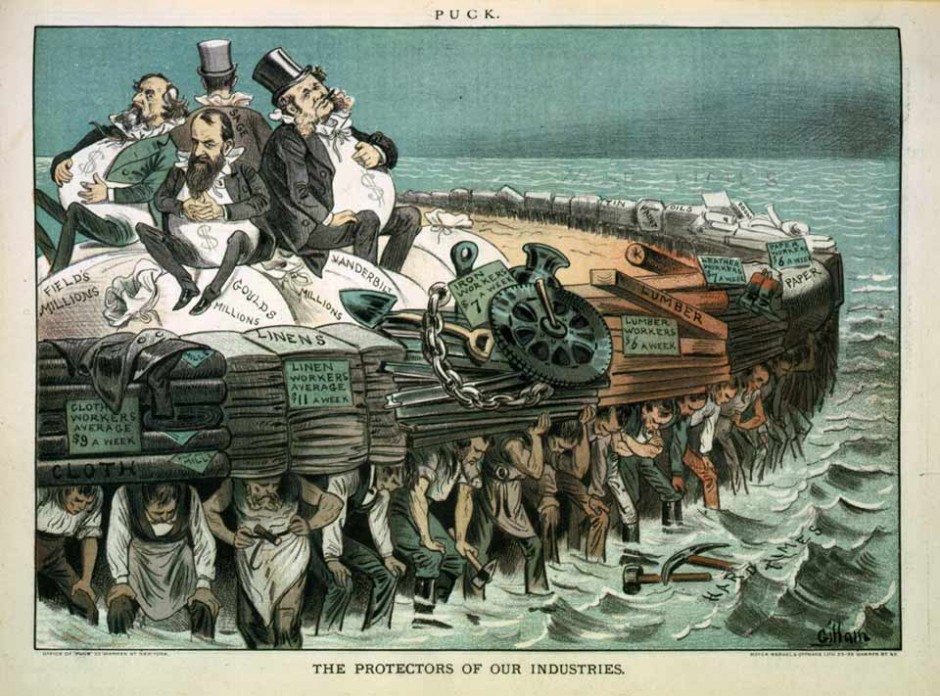The views expressed in our content reflect individual perspectives and do not represent the authoritative views of the Baha'i Faith.
Gracious God! How can one see one’s fellow men hungry, destitute and deprived, and yet live in peace and comfort in one’s splendid mansion? – Abdu’l-Baha, Some Answered Questions, newly revised edition, p. 319.
When Abdu’l-Baha visited Europe and North America in the early 1900s, the labor movement had taken the Western world by storm—sometimes a very violent storm.
Developed in almost exactly the same timeframe as the emergence of the Baha’i Faith—the International Workingman’s Association, the first international union, came into being in 1864, a year after Baha’u’llah founded the Faith in 1863—the unions developed as a result of the Industrial Revolution, the harsh exploitation of employees by capitalist “Robber Barons” and the grim, often fatal conditions for the working class during that period.

a political cartoon from 1883 depicting ’Robber Barons’
By the early 1900s, labor and management had come to violent, polarized odds. Labor strikes spread all across Europe and the United States. Violence often accompanied such strikes, especially when factory and mine owners hired “strikebreakers,” armed thugs or police who assaulted and killed striking workers. Some union members retaliated by bombing buildings, most famously the Los Angeles Times in 1910, killing 21 people and injuring 100.
In one famous series of incidents called the “Bread and Roses Strike” which immediately preceded Abdu’l-Baha’s arrival in North America, female textile workers in Lawrence, Massachusetts, many of them recent immigrants, united with the militant Industrial Workers of the World (IWW) Union and walked out of their jobs in manufacturing plants. Their slogan, Bread and Roses, symbolized their demands for better wages and working conditions:
Thirty-six of every 100 of all men and women who work in the mills die before or by the time they are 25 years of age. … While the mill hands lived and died in poverty, their employers thrived. – The Massachusetts Bureau of Labor Statistics, 1911.
In one Bread and Roses incident, several striking women were beaten by police while putting their children on a train for safekeeping; and in another police shot and killed a female striker, Anna LoPizzo, while she walked in a legal march. Those incidents shocked the world, and the mill owners finally settled the strike.
When Abdu’l-Baha arrived a month later, he spoke extensively, at many of his stops across North America, about the burning issues of labor, management and justice. He made many specific recommendations for solving the injustices the Industrial Revolution had brought, including these three: profit-sharing, joint employee ownership and the elimination of business trusts.
…the factory workers reap a fortune every day, but the wage the poor workers are paid cannot even meet their daily needs: This is most unfair, and assuredly no just man can accept it. Therefore, laws and regulations should be enacted which would grant the workers both a daily wage and a share in a fourth or fifth of the profits of the factory in accordance with its means, or which would have the workers equitably share in some other way in the profits with the owners. – Abdu’l-Baha, Some Answered Questions, newly revised edition, p. 317.
In several places in his writings, Abdu’l-Baha went beyond simply advocating the adoption of profit-sharing to actual ownership-sharing:
Concerning the case of profit-sharing by the employers among the workers, which thou hadst written about, undoubtedly the workers must secure their daily salary, and in addition, must have shares with the employers so that they may engage with the utmost effort in that work. For example, a capitalist has a thousand employees, he must give them a moderate salary every day, that they may not remain hungry and naked, and also assign a definite share of the profit to the workers so that at the beginning of each year it may be distributed among them, that this may cause the workers to exert the utmost care and effort in their job. – Abdu’l-Baha, Star of the West, Volume 6, p. 335.
Abdu’l-Baha also spoke out on the bigger issue of the trusts—large business conglomerates that prevented competition and worked together to keep wages low. He advocated for anti-trust laws to protect the working class:
The owners of properties, mines and factories should share their incomes with their employees and give a fairly certain percentage of their products to their workingmen in order that the employees may receive, beside their wages, some of the general income of the factory so that the employee may strive with his soul in the work.
No more trusts will remain in the future. The question of the trusts will be wiped away entirely. Also, every factory that has ten thousand shares will give two thousand shares of these ten thousand to its employees and will write the shares in their names, so that they may have them, and the rest will belong to the capitalists. Then at the end of the month or year whatever they may earn after the expenses and wages are paid, according to the number of shares, should be divided among both. In reality, so far great injustice has befallen the common people. Laws must be made because it is impossible for the laborers to be satisfied with the present system. – Abdu’l-Baha, Foundations of World Unity, pp. 43-44.
All of these spiritual principles in the Baha’i teachings—fairness, equity, the voluntary sharing of the wealth—can make for a more united and prosperous community life for all. In this moderate, equitable system envisioned by the Baha’i principles, the era of labor unrest and management injustice can finally come to an end.

















Comments
Sign in or create an account
Continue with Facebookor